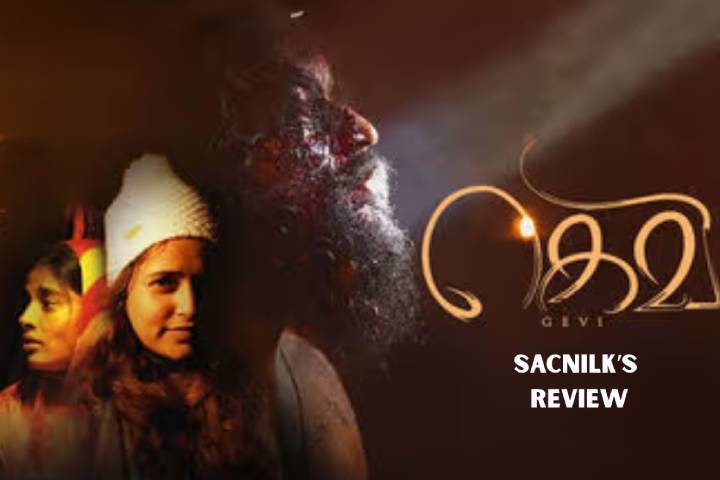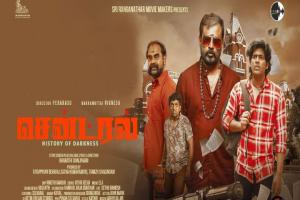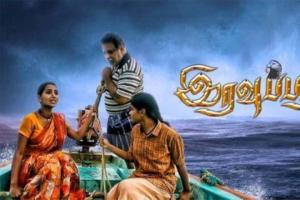Gevi – Movie Review: When Realism Meets Raw Emotion
At the heart of the film is the tender relationship between Mandharai and Malaiyan (played brilliantly by Sheela Rajkumar and Aadhavan), a couple awaiting the birth of their child. While the film follows several storylines, it’s their journey that forms the emotional core.
In one beautifully written moment, the couple is caught in the rain. The pregnant Mandharai says the raindrops feel like their unborn child’s tiny kisses. Malaiyan chuckles and says it feels more like the baby is urinating. It's a brief, funny exchange — but when the film snaps back to the present, where their lives are hanging by a thread, you realise what’s truly at stake: not just survival, but the little dreams, hopes, and joys they’re fighting to protect. Moments like these pull us deep into Gevi’s world.
Mandharai goes into labour, but with no hospital or proper transport available in their remote village, she must be carried downhill in a makeshift cradle. Her pain exposes a deeper truth: the quiet cruelty of being neglected by a system that offers no safety net. Her suffering reflects the kind of oppression born from inaction and apathy — where the absence of help becomes its own form of violence, especially against women in crisis.
Meanwhile, Malaiyan’s torture at the hands of the police highlights a different kind of brutality — one that comes from force and control. He dares to speak up against injustice, and the system answers with beatings and threats. His pain stands for every voice crushed for demanding dignity. Together, their struggles show how oppression works in two ways: by failing to help, and by punishing those who ask for help.
Though the film includes the familiar “good cop, bad cop” trope, it feels unnecessary. The presence of kind-hearted characters elsewhere in the story already proves that the system has good people — but when one “good apple” is placed in a rotten bunch, it risks weakening the film’s stronger message.
The recurring use of oppari (folk lament) adds to the emotional weight, but also reflects the contradictions within the community and their fight for justice. At times, the film quietly suggests that the people may share some responsibility for their condition, but Tamil Dhayalan handles this with care, never losing sight of their dignity.
Despite a few flaws, it’s the performances that carry Gevi forward. Sheela Rajkumar and Aadhavan are magnetic, and Vivek Mohan as Mandharai’s brother adds strength to the story. There’s a rawness in every frame that makes the film feel real — not like it’s trying to entertain the privileged, but like it’s telling a truth that needs to be heard.
In the end, Gevi doesn’t just show a couple’s fight for life — it shows an entire community’s battle for basic rights, love, and hope.
In one beautifully written moment, the couple is caught in the rain. The pregnant Mandharai says the raindrops feel like their unborn child’s tiny kisses. Malaiyan chuckles and says it feels more like the baby is urinating. It's a brief, funny exchange — but when the film snaps back to the present, where their lives are hanging by a thread, you realise what’s truly at stake: not just survival, but the little dreams, hopes, and joys they’re fighting to protect. Moments like these pull us deep into Gevi’s world.
Mandharai goes into labour, but with no hospital or proper transport available in their remote village, she must be carried downhill in a makeshift cradle. Her pain exposes a deeper truth: the quiet cruelty of being neglected by a system that offers no safety net. Her suffering reflects the kind of oppression born from inaction and apathy — where the absence of help becomes its own form of violence, especially against women in crisis.
Meanwhile, Malaiyan’s torture at the hands of the police highlights a different kind of brutality — one that comes from force and control. He dares to speak up against injustice, and the system answers with beatings and threats. His pain stands for every voice crushed for demanding dignity. Together, their struggles show how oppression works in two ways: by failing to help, and by punishing those who ask for help.
Though the film includes the familiar “good cop, bad cop” trope, it feels unnecessary. The presence of kind-hearted characters elsewhere in the story already proves that the system has good people — but when one “good apple” is placed in a rotten bunch, it risks weakening the film’s stronger message.
The recurring use of oppari (folk lament) adds to the emotional weight, but also reflects the contradictions within the community and their fight for justice. At times, the film quietly suggests that the people may share some responsibility for their condition, but Tamil Dhayalan handles this with care, never losing sight of their dignity.
Despite a few flaws, it’s the performances that carry Gevi forward. Sheela Rajkumar and Aadhavan are magnetic, and Vivek Mohan as Mandharai’s brother adds strength to the story. There’s a rawness in every frame that makes the film feel real — not like it’s trying to entertain the privileged, but like it’s telling a truth that needs to be heard.
In the end, Gevi doesn’t just show a couple’s fight for life — it shows an entire community’s battle for basic rights, love, and hope.
Comments
Write Your Comment Here
Max comment length: 100 words; Please don't use bad language otherwise your comment will be removed
Related News
Trending News
| Related Comparison News |
|---|
Entertainment
Big NewsQuick News
Recent News
Recent Movies
Upcoming Movies
Upcoming Birthdays
Recent Songs
Recent Movies Collection
Sports
Politics
Sports
Internet
India
Education
FeedbackAbout
Contact Us
T&C
Privacy Policy
Cancellation/Refund Policy
Are you a writer/blogger, Work with Us
© Sacnilk Technologies Pvt. Ltd. All Rights Reserved


 Movies
Movies  Movies
Movies  Kollywood
Kollywood Movies
Movies  Movies
Movies  Movies
Movies